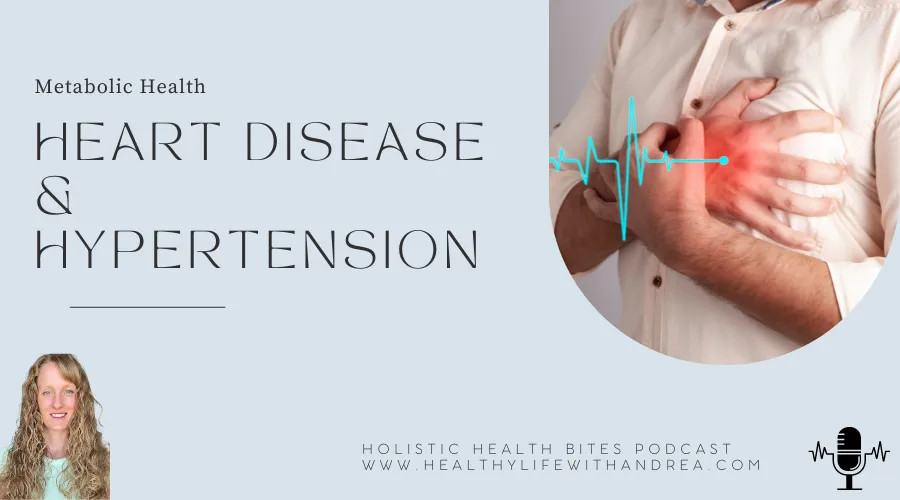
Metabolic Dysfunction is Not Just Diabetes
Metabolism isn't just about calorie burn. And metabolic dysfunction isn't just about diabetes. Nearly every chronic disease has a connection to or is worsened by insulin resistance and metabolic dysfunction. Read, listen or watch to learn more about some of the connected conditions.
EPISODE DETAILS:
Today, we’re talking about conditions most people don’t know are connected to metabolic dysfunction.
In no particular order….
IBS:
When the cells of the intestine become dysfunctional, they literally can’t do their jobs properly. This happens, in part, due to reduced mitochondrial activity, which means those cells can’t make or use energy efficiently. This reduced activity contributes to abdominal pain, loose stools or constipation, and even changes in appetite based on the transit time of your prior meal.
If you have IBS, you are also twice as likely to have metabolic syndrome and elevated triglycerides. Insulin resistance also damages or interferes with the enteric nervous system in the gut altering the contraction and relaxation of the intestinal muscles. Insulin resistance also disrupts the gut barrier function leading to leaky gut.
This leaky gut can cause inflammation, chronic infections, food sensitivities, and many other systemic problems outside of the gut.
Acne:
Elevated insulin and blood sugar can drive hormone changes that can cause acne to develop. Insulin can lead to higher levels of male hormones that can produce extra skin oil which can clog hair follicles and give bacteria a place to grow. Those with acne have also been found to have higher levels of oxidative stress and mitochondrial damage which can lead to conditions like alopecia areata, atopic dermatitis, lichen planus, scleroderma, vitiligo, rosacea, sun damage, psoriasis, and more.
Interesting side note, many people, myself included, have noted far less sunburns when eliminating industrial seed oils and reversing insulin resistance.
Depression:
Mitochondrial dysfunction, inflammation and oxidative stress are involved here too, much like it does in the gut. The gut-brain axis is the communication pathway between the digestive tract and the central nervous system.
The gut microbiome plays a huge role in regulation and production of key neurotransmitters responsible for mood and behavior. Anything that disturbs the gut, also strongly impacts the brain and mental health. This is why IBS and depression have such a strong link. Depression results from mitochondrial dysfunction reducing energy production, alterations in neurotransmitter signaling, inflammation, neural cell death, and alterations in the stress response.
Unstable blood sugars cause more stress and cellular damage. One study even showed that for every 18mg/dl increase in blood sugar there is a 37% higher rate of depression. There have been numerous reports of connections between metabolic dysfunction and suicidal ideation.
Chronic pain:
Again mitochondrial dysfunction plays a role here, along with alterations in neurotransmitters. Insulin resistance also alters cellular metabolism in muscles and nerves leading to loss of muscle, degradation of joints, and other associated causes of pain.
Arthritis:
Arthritis is inflammation of the joint tissue that causes damage, leading to pain. The cause of the inflammation can be oxidative stress, excess weight, sedentary lifestyle, poor diet leading to nutrient deficiencies, stress, and toxins.
Hearing loss:
Age does have an impact on hearing due to many years of damaging noise and other factors can cause harm, but not all hearing loss is inevitable. Insulin resistance can alter the energy production and utilization in the auditory system. This very delicate system requires a lot of signal coordination and has very tiny capillaries that transport blood and nutrients. These capillaries are easily blocked, depleting the nutrients needed for proper cell signaling. One study showed that people with elevated blood sugar had 42% more hearing impairment, compared to only 24% with normal blood sugar for subjects at the same age.
Sinus issues:
Elevated blood sugar increases the likelihood of developing inflammation of the sinuses, even 2.7 times higher if you have type 2 diabetes. The same inflammatory markers can increase with sinusitis as they do with heart disease, obesity, and type 2 diabetes. The same inflammatory cascade is showing up in different ways.
Autoimmunity:
Many autoimmune conditions have been linked to metabolic dysfunction. Those with conditions such as Sjogren’s syndrome, Hashimoto’s thyroiditis, rheumatoid arthritis, multiple sclerosis, psoriasis, irritable bowel disease, lupus, and more are more likely to develop obesity and type 2 diabetes. When cells can’t make energy properly, they send out danger signals which can cause the immune system to invade, sometimes attacking its own tissues. People with autoimmune conditions have 1.5 to 2.5 times the rate of insulin resistance and metabolic syndrome.
Migraine:
People with migraines tend to also have higher insulin levels and insulin resistance. Nutrient deficiencies are also tied to migraine development, as they are necessary for mitochondrial function. Micronutrients like B vitamins, vitamin D, magnesium, CoQ10, alpha lipoic acid, and L-carnitine.
Now…while we’re talking about nutrients…please don’t just rush out and buy the first multivitamin or supplement you can find. Most of these nutrients can be obtained readily in a quality, well-rounded diet. Many supplements on the market aren’t of ideal quality, may not be absorbable forms, and may not have anywhere near enough of the nutrient to do you any good. I’m absolutely not against supplements, but most of what you’ll find in your local grocery store, pharmacy, or vitamin shop aren’t really the best options. Food first, then quality supplements for additional needs.
Back to migraines…B12, specifically has been shown to be very helpful in preventing migraines. On a related note, many other types of headaches are also related to blood sugar imbalances.
Infertility and hormone imbalances:
In females, polycystic ovarian syndrome (PCOS) is the most common cause of infertility. In males, erectile dysfunction is the leading cause of infertility. Both can be directly related to insulin resistance.
In PCOS, insulin is the driving force, causing the theca cells of the ovary to produce more testosterone which alters the production of the other sex hormones needed for proper follicle development, ovulation, and menstrual cycles. Nearly half of all females who have PCOS also go on to develop Type 2 diabetes. Unfortunately, modern medicine tends to recommend synthetic hormones or expensive and invasive medical procedures to assist in female infertility, failing to address the fact that those with metabolic dysfunction have more than double the risk of miscarriage.
In males, sperm count has decreased by 50-60% in the last half century, with an 81% chance of having no sperm at all in obese males. Obesity in males causes more testosterone to convert to estrogen, where the body fat is acting like a big ovary, as Dr. Ben Bikman likes to say. Fat tissue produces an enzyme called aromatase that is a normal biological enzyme responsible for making the normal conversion of testosterone to estrogen. This is a NORMAL process. ALL estrogens originate as testosterone. However, when body fat increases, so does aromatase, which can lead to much higher levels of estrogen and much lower levels of testosterone…the exact opposite of what males need for ideal health.
Oxidative stress also damages the sensitive sperm cell membranes, impairs sperm development, damages sperm DNA, reducing sperm quality and increasing the risk of miscarriage. This same oxidative stress also naturally decreases testosterone production. ED is caused by changes to blood flow to tissues and nerves needed for proper erectile function.
Miscarriage rates have increased by 10% in the last decade alone, which can be due to any of the factors we’ve already discussed or even placental dysfunction leading to issues with nutrient and oxygen delivery, waste removal, hormone synthesis, and immune regulation.
Chronic Fatigue:
The most common cause of medical visits is due to fatigue. 67% of people in the US report regular fatigue at work, 70 million report sleep issues, and 90% of people consume caffeine daily. Reduced energy production, unstable blood sugars, hormone imbalances, and sleep disturbances contribute to persistent fatigue. The lack of sleep is both caused by and worsens metabolic dysfunction.
Obesity and Fatty Organs:
Obesity has dramatically increased, in adults and children over the last 50 years. Fatty liver disease, used to be mostly caused by alcohol consumption and Hepatitis C infection…now much more commonly in adults and children is caused by metabolic dysfunction due to poor diet, stress, and toxins. I’ve done prior episodes on fatty liver on the Holistic Health Bites podcast before (episodes 75, 85, 116, and 131). Fat doesn’t just accumulate in the liver, though. Any tissue in the body can be infiltrated with fat in a metabolically unhealthy state. This can lead to pancreatic dysfunction, difficulty swallowing, kidney filtration issues, brain and cognitive changes, increased cardiovascular disease, and more.
ADHD and other brain disorders:
We think of conditions like ADHD and autism as childhood diseases, but they can affect people well into adulthood, as can childhood depression, anxiety and other mental health disorders. Studies have shown that a mother with obesity and diabetes has 4 times the risk of having a child with autism and twice the risk of having a child with ADHD.
Frequent infections:
Many kids get sick a lot, yet some seem to get everything. Frequent ear infections, recurrent sore throats, or bouts of the ‘flu’. The same is true for adults…some get everything going around and some get the worst cases of everything they catch. Are they just unlucky? No. This can also be directly linked to metabolic dysfunction. If the cells can’t make energy properly, this can impact how efficiently and effectively they can mount an immune attack. Poor diet associated with metabolic dysfunction is also lacking in key nutrients needed to fend off attacks, setting up the environment for bad microbes to take hold. The chronic inflammation associated with metabolic dysfunction is also distracting and depleting the immune system on a daily basis. Add to that the damage done to the microbiome from frequent antibiotics, NSAIDs, over the counter cold remedies, and every other medication, and the cycle perpetuates.
COPD and respiratory issues:
COPD is the leading cause of respiratory disease and is caused by inflammation that damages the lung tissue. Smoking increases the risk of developing COPD by causing damage to the mitochondria in the lungs. However, COPD can develop in non-smokers as well. Studies have shown those who have been diagnosed with COPD saw improvement in symptoms when they improved blood sugar levels.
Stroke:
Elevated blood sugars most directly damage the blood vessels. Those with prediabetes have 60% higher risk of stroke than those with normal glucose levels. Insulin resistance leads to excess blood clotting, reduced nitric oxide production and therefore reduced blood vessel dilation, and increased plaque formation.

Dementia:
The brain is an energy hog. When metabolic dysfunction sets up in the brain, many cognitive and mental changes can happen. When the brain tissue struggles to take up glucose due to insulin resistance, this can starve the mitochondria of needed fuel. Without the mitochondria being able to make energy, the brain tissue can suffer and many issues can appear throughout the body that are driven by brain activity. Alzheimer’s disease is being referred to as “type 3 diabetes” because of its connection to insulin resistance of the brain.
Heart disease:
Just like discussed with stroke risk, the blood vessels are one of the first tissues damaged by elevated blood sugars. This directly increases the risk of atherosclerosis. Along with reduced nitric oxide levels, the blood vessels become more rigid and less flexible, which alters blood pressure. Elevated blood pressure also strains the blood vessels, increasing the risk of damage. Insulin also alters production of several hormones like aldosterone which play a significant role in blood pressure regulation, kidney function, and mineral balance.
This by no means is an exhaustive list of conditions either directly caused by or worsened by insulin resistance and metabolic dysfunction. Hopefully, this opens your eyes to the wide ranging symptoms, diagnoses, and diseases that are connected. While addressing metabolic dysfunctions may not entirely remove your risk of developing these conditions and may not fully resolve any you already have…you absolutely WILL feel better with improved overall function by addressing your metabolic health.





















0 Comments